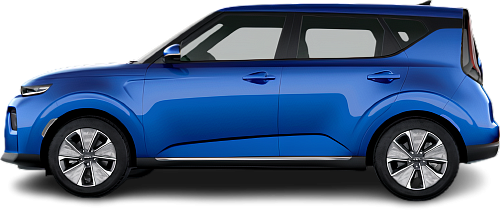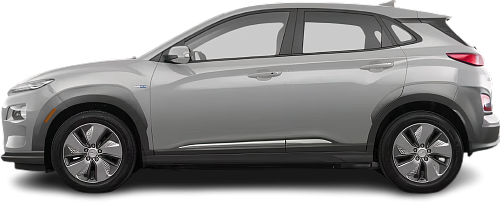USA EV Comparison: Kia Soul EV Long Range vs Hyundai Kona Electric Standard Range
Struggling to Decide? Let AI Help!
Your AI Summary Is Ready!
General Info
While the Kia Soul EV Long Range (2020-…) is currently produced, it is not offered for sale in the United States. The Hyundai Kona Electric Standard Range (2018-2019) has been discontinued, it was never offered for sale in the United States.
The two vehicles share the same body style: SUV.
| Property | Kia Soul EV Long Range | Hyundai Kona Electric Standard Range |
|---|---|---|
| Years of Production | 2020-… | 2018-2019 |
| Current Status | Produced | Discontinued |
| Country of Manufacture | South Korea | South Korea |
| Body Style | SUV | SUV |
| Market Availability | EU | EU |
| GCC Score | 5.6 | 5.2 |
Range and Efficiency
While the Kia Soul EV Long Range (2020-…) offers a longer real-world range and a bigger battery, it is less energy-efficient than the Hyundai Kona Electric Standard Range (2018-2019).
| Property | Kia Soul EV Long Range | Hyundai Kona Electric Standard Range |
|---|---|---|
| Range (EPA) | 243 mi | - Range (EPA) |
| Range (WLTP) | 281 mi | 180 mi |
| Range (GCC) | 235 mi | 153 mi |
| Battery Capacity (Nominal) | 67.5 kWh | 42 kWh |
| Battery Capacity (Usable) | 64 kWh | 39.2 kWh |
| Efficiency per 100 mi | 27.2 kWh/100 mi | 25.6 kWh/100 mi |
| Efficiency per kWh | 3.67 mi/kWh | 3.9 mi/kWh |
| Range and Efficiency Score | 6.8 | 5.8 |
Charging
Both vehicles utilize a standard 400-volt architecture.
The Kia Soul EV Long Range (2020-…) offers faster charging speeds at DC stations, reaching up to 77 kW, while the Hyundai Kona Electric Standard Range (2018-2019) maxes out at 44 kW.
Both vehicles are equipped with the same on-board charger, supporting a maximum AC charging power of 7.2 kW.
| Property | Kia Soul EV Long Range | Hyundai Kona Electric Standard Range |
|---|---|---|
| Max Charging Power (AC) | 7.2 kW | 7.2 kW |
| Max Charging Power (DC) | 77 kW | 44 kW |
| Architecture | 400 V | 400 V |
| Charge Port | CCS Type 2 | CCS Type 2 |
| Charging Score | 4.5 | 4 |
Performance
Both vehicles are front-wheel drive.
The Kia Soul EV Long Range (2020-…) boasts greater motor power and accelerates faster from 0 to 60 mph.
| Property | Kia Soul EV Long Range | Hyundai Kona Electric Standard Range |
|---|---|---|
| Drive Type | FWD | FWD |
| Motor Type | PMSM | PMSM |
| Motor Power (kW) | 150 kW | 100 kW |
| Motor Power (hp) | 201 hp | 134 hp |
| Motor Torque | 291 lb-ft | 291 lb-ft |
| 0-60 mph | 7.6 s | 9.3 s |
| Top Speed | 104 mph | 96 mph |
| Performance Score | 3.8 | 3.1 |
Dimensions
The Kia Soul EV Long Range (2020-…) is taller, but has a similar length and width to the Hyundai Kona Electric Standard Range (2018-2019).
Both models have similar wheelbase lengths.
| Property | Kia Soul EV Long Range | Hyundai Kona Electric Standard Range |
|---|---|---|
| Length | 165.2 in | 164.6 in |
| Width (with Mirrors) | - Width (with Mirrors) | 81.5 in |
| Width (w/o Mirrors) | 70.9 in | 70.9 in |
| Height | 63.2 in | 61.8 in |
| Wheelbase | 102.4 in | 102.4 in |
Cargo and Towing
The Hyundai Kona Electric Standard Range (2018-2019) features a larger trunk, but the Kia Soul EV Long Range (2020-…) offers greater maximum cargo capacity when the rear seats are folded.
Neither car is equipped with a frunk (front trunk).
Neither vehicle is officially rated for towing in the US.
| Property | Kia Soul EV Long Range | Hyundai Kona Electric Standard Range |
|---|---|---|
| Number of Seats | 5 | 5 |
| Curb Weight | 3876 lb | 3549 lb |
| Cargo Volume (Trunk) | 11.1 ft3 | 19.2 ft3 |
| Cargo Volume (Max) | 47.3 ft3 | 45.8 ft3 |
| Cargo Volume (Frunk) | - Cargo Volume (Frunk) | - Cargo Volume (Frunk) |
| Towing Capacity | - Towing Capacity | - Towing Capacity |
| Cargo and Towing Score | 5.5 | 5.3 |




